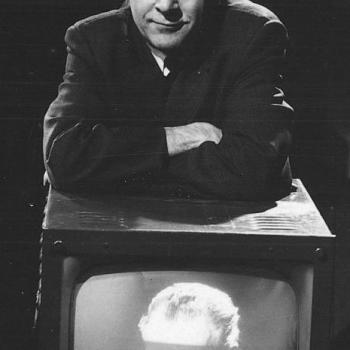A classic has been defined as a work of art that still holds up after 50 years. The songs of the Beatles have attained that status. And last Thursday, on September 8, so has Star Trek.
To mark the occasion, Edward Gross and Mark A. Altman have written The Fifty-Year Mission: The Complete, Uncensored, Unauthorized Oral History of Star Trek. It exists in two volumes, one about the first 25 years and the other about the next 25 years.
But, according to this book, Gene Roddenberry, who had the idea for the series, was not responsible for its creative success. In fact, he was always messing it up. Another Gene, Gene Coon, gave the show many of the qualities that so endears it to fans. Read the review by Matthew Continetti, excerpted and linked after the jump.
From Matthew Continetti, Star Trek — Gene Roddenberry Was A Misogynistic Hack | National Review:
The book is an extraordinary achievement of research and reporting, filled with inside scoop and backstage drama, fragile egos and the surmounting of great technical challenges. It’s essential for diehards, as well as for readers interested in film and television production in general.
But there is a problem. Intended as a tribute to Star Trek and its creator, The Fifty-Year Mission ends up debunking the Roddenberry mythos. Liberal visionary? Maybe. But he was also an insecure, misogynistic hack. . . .
Roddenberry’s insecurities were apparent from the start. He fought with the studios, the network, the writers, anyone who crossed his path. “During the first year,” he says, “I wrote or rewrote everybody, even my best friends, because I had this idea in my mind of something that hadn’t been done and I wanted to be really there. Once we had enough episodes, then the writers could see where we were going, but it was really building people to write the way I wanted them to write.”
But no one could do that. Roddenberry never stopped rewriting. “The problem,” says his biographer Joel Engel, “was that he basically couldn’t write well enough to carry it off.” For 25 years, a script never left Roddenberry’s hands without becoming worse.
For all of the control Roddenberry exercised over Star Trek, the franchise prospered only when it was under the aegis of others. As early as one month before the show’s premiere, an exhausted and embattled Roddenberry took a vacation. Television veteran Gene L. Coon, a Marine veteran of the Pacific, was hired as producer. “To a large degree,” write Gross and Altman, “it would be Coon who would ultimately define the show creatively in the coming months.”
The Star Trek that has imprinted itself on fans for decades is Gene L. Coon’s. His shows deepened the relationships between Captain Kirk, Mr. Spock, and Dr. McCoy. He created the Klingons. There was more humor. Says writer David Gerrold, “Gene L. Coon created the noble image that everyone gives Roddenberry the most credit for.” Shatner puts it this way: “Gene Coon had more to do with the infusion of life into Star Trek than any other single person.”
[Keep reading. . .]















